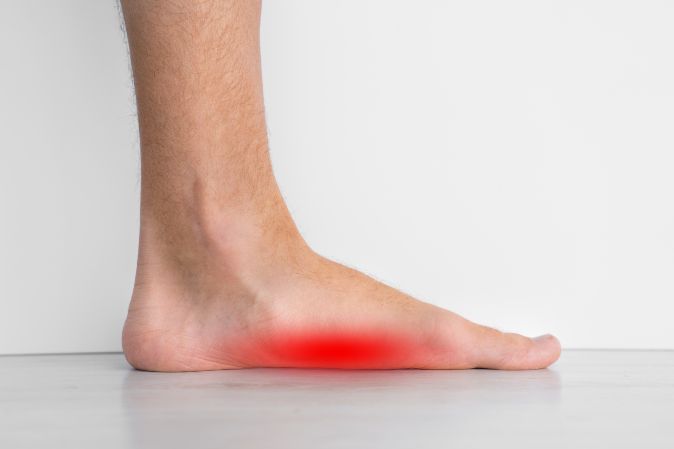
Flat Feet (Pes Planus) Treatment
At Phoenix Podiatry, we specialize in the comprehensive treatment of conditions associated with flat feet, also known as Pes Planus. Flat feet occur when the arches of the feet collapse, causing the entire sole of the foot to come into contact with the ground.
This condition can lead to foot pain, discomfort, and altered foot biomechanics. Common conditions associated with flat feet include:
Plantar Fasciitis: Flat feet can contribute to the development of plantar fasciitis, which is inflammation of the plantar fascia—a thick band of tissue that runs along the bottom of the foot. This condition often causes heel pain and stiffness.
Overpronation: Flat feet can lead to overpronation, where the foot rolls excessively inward during walking or running. Overpronation can increase the risk of various foot and lower leg problems, including shin splints, Achilles tendonitis, and stress fractures.
Bunions: Flat feet can alter the foot’s biomechanics and contribute to the development of bunions. Bunions are bony bumps that form at the base of the big toe, causing pain, swelling, and deformity.
Arch Strain: The lack of arch support in flat feet can lead to strain and discomfort in the arch area. This can result in arch pain, fatigue, and aching in the feet and lower legs.
Ankle Instability: Flat feet can affect the stability of the ankle joint, increasing the risk of ankle sprains and instability. The lack of proper arch support and alignment can contribute to ankle instability.
Shin Splints: Flat feet can alter the distribution of forces during walking or running, placing excessive stress on the muscles and tissues along the shinbone. This can result in shin splints, which cause pain and tenderness along the front of the lower leg.
Lower Back Pain: The altered foot mechanics associated with flat feet can have a cascading effect on the entire lower body, including the lower back. Flat feet can contribute to poor posture and alignment, leading to lower back pain and discomfort.
Tendonitis: Flat feet can increase the risk of tendonitis, which is inflammation of the tendons. Tendonitis commonly affects the posterior tibial tendon, which runs along the inner side of the ankle and supports the arch. This condition can cause pain, swelling, and difficulty with walking.
It’s important to note that not everyone with flat feet will experience these conditions, and the severity of symptoms can vary. If you have flat feet and are experiencing foot pain or discomfort, it is advisable to consult with a podiatrist for a proper evaluation and personalized treatment plan.
At Phoenix Podiatry, we offer a range of treatment options to address the various conditions associated with flat feet. Our experienced podiatrists will conduct a thorough evaluation to determine the most suitable treatment plan for your specific needs. Treatment options may include:
Custom Orthotic Devices: Custom orthotics are specially designed shoe inserts that provide arch support and help align the foot properly. They can help distribute pressure evenly, reduce overpronation, and improve overall foot function.
Stretching and Strengthening Exercises: Our podiatrists will guide you through specific stretching and strengthening exercises to improve the flexibility and strength of the muscles and ligaments supporting your feet. These exercises can help alleviate symptoms, improve stability, and promote better foot biomechanics.
Foot Mobilization Techniques: Foot mobilization involves manual manipulation of the foot joints and surrounding tissues to improve joint mobility, correct alignment, and reduce pain. Our podiatrists may employ various techniques to restore optimal foot function.
Low-Level Laser Therapy (LLLT): LLLT, also known as cold laser therapy, utilizes low-intensity laser or light to stimulate cellular function and promote tissue healing. It can be beneficial in reducing inflammation, relieving pain, and enhancing the healing process for certain foot conditions associated with flat feet.
Referrals for Imaging: In some cases, X-rays or ultrasound imaging may be necessary to assess the bony structures, soft tissues, and alignment of the foot. Our podiatrists can refer you to an appropriate imaging facility for further evaluation if required.
Footwear Recommendations: Choosing appropriate footwear is crucial for managing flat feet. Our podiatrists will assess your current shoes and provide recommendations for footwear that offers adequate arch support, cushioning, and stability. Well-fitted shoes can help support the arches, reduce discomfort, and improve overall foot function.
Referrals to Other Specialists: If necessary, our podiatrists may refer you to other healthcare professionals such as physiotherapists, orthopedic specialists, or sports medicine practitioners for further evaluation or collaborative care.
Each treatment plan is tailored to the individual needs of our patients. Our podiatrists will work closely with you to develop a comprehensive approach that addresses your specific condition and goals.
To book an appointment or learn more about our flat feet treatment options, please contact us at 9434 2006 or conveniently BOOK ONLINE now. Our knowledgeable team is ready to assist you in finding relief from foot discomfort and improving the function of your feet.
